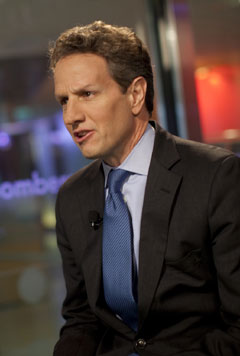World Business
'Uncertainties' damage euro's value
By BEN LEVISOHN (China Daily)
Updated: 2010-05-17 10:07
 |
Large Medium Small |
NEW YORK - The euro fell to its lowest level since the collapse of Lehman Brothers Holdings Inc on concern that the 16-nation currency may be headed for disintegration.
The shared currency fell for a fourth week versus the dollar and a third week versus the yen, the longest losing streaks since February. It came as German Chancellor Angela Merkel said that Europe was in a "very, very serious situation" despite a rescue package for the region's most indebted nations. European Central Bank Governing Council member Axel Weber will speak on financial market regulation this week in Berlin.
"We went through a massive liquidation trade in Europe and risk-taking positions were wiped out across the board," said Sebastien Galy, a currency strategist at BNP Paribas SA in New York. "The markets are trying to figure out what the consequences are for growth. There are massive uncertainties and that will keep the downward pressure on the euro."
The euro fell 3.1 percent to $1.2358 last week, from $1.2755 on May 7. It traded as low as $1.2354 on Friday, the weakest since October 2008. The common currency dropped 2.1 percent to 114.38 yen, from 116.81 last week. The dollar traded at 92.47 yen after gaining 1 percent last week, the first weekly gain since the five days ending April 23.
European policy makers last week unveiled a loan package worth almost $1 trillion and a program of bond purchases in an effort to contain a sovereign-debt crisis that has threatened to shatter confidence in the euro. European Central Bank (ECB) President Jean-Claude Trichet said the move wasn't supported by all 22 of the bank's Governing Council members.
The ECB said it would intervene in government and private bond markets "to ensure depth and liquidity in those market segments which are dysfunctional". Central banks in Germany, Italy and France began buying government bonds on Friday. The ECB restarted a dollar swap line with the Federal Reserve.
|
 |
|
US Treasury Secretary Timothy Geithner speaks during a recent interview in Washington. Geithner said he was confident European policy makers would certain the continent's sovereign debt crisis without harming America's economy or financial markets. [ANDREW HARRER / BLOOMBERG] |
By resorting to what some economists have called the "nuclear option", the ECB may open itself to the charge it is undermining its independence by helping governments plug budget holes.
"The ECB's supposed 'independence' has now been shown to be nothing more than a sham, a chimera, a will-o'-the-wisp," said Dennis Gartman, an economist and hedge-fund managerbased in Suffolk, Virginia, in his daily Gartman Letter on May 10. "In the end the ECB and the euro will be punished for this decision to stand down from what had previously been considered sacred."
The greenback rose against Australia's dollar and Norway's krone, as oil and commodities retreated, damping demand for currencies linked to growth.
The Aussie fell 0.2 percent to 88.64 US cents and the krone declined 0.4 percent to 6.2465 per dollar on speculation investors reversed carry trades that had profited from Australia's 4.5 percent central bank rate and Norway's 2.115 one-month deposit rate.
The benchmark rate of zero to 0.25 percent in the US makes the dollar a popular funding currency for such trades. Such strategies lose money as the funding currency gains because it costs more to repay the loan.
Crude oil for June delivery fell 4.1 percent last week and the Reuters/Jeffries CRB Index of 19 commodities fell 2.8 percent on Friday. Norway is the world's sixth largest oil exporter. Australia is the world's biggest iron ore exporter.
Gold for immediate delivery on Friday reached an all-time high of $1,249.40 an ounce in New York as investors sought to hedge against Europe's debt crisis.
The German chancellor's comments followed a report from El Pais that French President Nicolas Sarkozy threatened to pull out of the euro unless Merkel agreed to back the European Union's bailout plan at a meeting two weekends ago in Brussels, citing comments Spain's Prime Minister Jose Luis Rodriguez Zapatero made at a meeting of socialist politicians. The Madrid-based newspaper didn't say how it obtained the information. Aides to Sarkozy, Merkel and Zapatero all denied the report.
"The euro is doomed," said Andrew Wilkinson, senior market analyst at Interactive Brokers Group LLC in Greenwich, Connecticut.
BLOOMBERG NEWS



